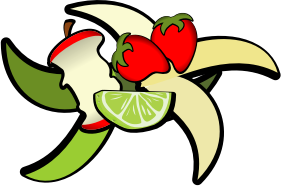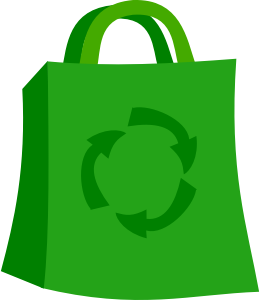 Biodegradable things are things that can decompose naturally. Compostable things are things that biodegrade fairly quickly. Things like apple cores, banana peels, egg shells, and newspapers. You’d think that those things would break down just fine whether they’re in your compost pile or in a landfill. But they don’t. Because in order to break down in that relatively short amount of time, they need air, and preferably some dirt and microorganisms too. And that stuff is lacking in landfills. Landfills don’t have much dirt. They don’t have many microorganisms. They don’t even have much air because everything in a landfill is packed so tight that it can hardly breathe. So stuff that could break down in a compost pile in just a couple of weeks may take years or even decades to break down in a landfill. So all those apple cores end up just sitting there and adding up and up and up. That means that even a little bit of composting means a lot less stuff in the landfill. Also, since composting means less trash, it also means fewer trash bags, which is good for the earth and saves you money.
Biodegradable things are things that can decompose naturally. Compostable things are things that biodegrade fairly quickly. Things like apple cores, banana peels, egg shells, and newspapers. You’d think that those things would break down just fine whether they’re in your compost pile or in a landfill. But they don’t. Because in order to break down in that relatively short amount of time, they need air, and preferably some dirt and microorganisms too. And that stuff is lacking in landfills. Landfills don’t have much dirt. They don’t have many microorganisms. They don’t even have much air because everything in a landfill is packed so tight that it can hardly breathe. So stuff that could break down in a compost pile in just a couple of weeks may take years or even decades to break down in a landfill. So all those apple cores end up just sitting there and adding up and up and up. That means that even a little bit of composting means a lot less stuff in the landfill. Also, since composting means less trash, it also means fewer trash bags, which is good for the earth and saves you money.
There are a few ways to do compost. You can have a compost pile, a worm tube, or or a compost bin.
Compost piles are pretty self-sufficient, although you may want to stir them up or add water during dry weather to speed up the decomposition process.
Worm tubes are lengths of PVC tube that have holds drilled into them and are then driven into the ground. Food scraps are placed in the top of the tube. Worms are attracted to the scraps, crawl in through the holes, and compost it up. The worms also aerate the soil and distribute all the nutrients from the compost and their castings. So you can put the worm tube right in the middle of your garden, and it will be a natural fertilizer. You can put a bowl or pot over the top of the tube to keep out flies and small animals.
Compost bins are sometimes on a base so that they can be easily turned and stirred up. Compost bins that do not turn on a base may be rolled on the ground or use red wiggler worms to speed up the decomposition process. The worms live, breed, and die in the bin. When done right, you can have an ongoing supply of worms in there. You can buy a compost bin or you can make your own. The easiest do it yourself composter is made out of a large plastic garbage can with a lid. Simply drill or poke holes around the garbage can to let out an extra liquid and to promote airflow.


